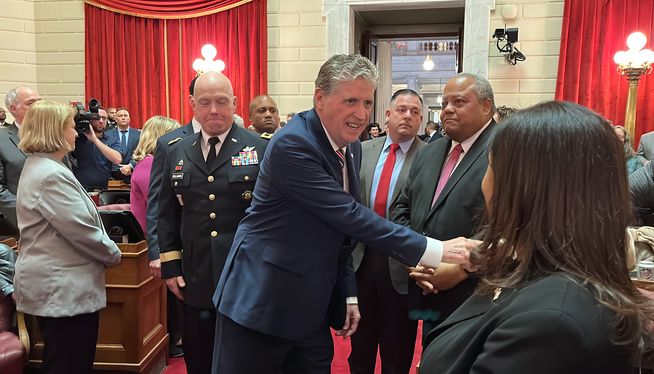
PROVIDENCE, R.I. (AP) — Rhode Island’s governor submitted a $13.75 billion state budget plan to the General Assembly on Thursday that seeks to invest in schools, provide tax relief to residents and repair roads and bridges.
Democratic Gov. Dan McKee said in the budget documents that he wants to demonstrate a commitment to education at all levels, so Rhode Island students will do as well as Massachusetts students on standardized tests by 2030.
McKee’s proposal for fiscal year 2024 is an increase of $930 million over last year’s proposal, and an increase of about $150 million, or 1.1%, from the enacted budget for the 2023 fiscal year.
In the budget plan, McKee keeps the campaign promise he made to expand the 2019 state law that enshrined abortion protections. He includes funding to add abortion coverage to Rhode Island’s Medicaid program and to the insurance coverage for state employees, at a projected cost of $622,000. A legislative proposal to do this last year faced criticism from abortion opponents, who said it would require taxpayers to pay for abortions.
The legislature will review the budget proposals and present its own plan before the fiscal year begins in July. Democrats dominate Rhode Island’s General Assembly and share many of McKee’s priorities, particularly when it comes to improving the educational system.
McKee wants to invest an additional $57.8 million in K-12 education and another $4 million for out-of-school learning programs, as well as modify the funding formula that allocates how state funding goes to schools to help districts with declining enrollment, support students with greater educational needs and improve outcomes.
The proposal increases aid to the state colleges by $14.2 million. It includes $7 million to preserve pre-K seats funded by a federal grant that is expiring and $1.3 million to prepare 35 new pre-K classrooms.
In his State of the State address Tuesday, McKee rolled out a nearly $100 million tax relief plan that is part of his budget proposal.
McKee wants to reduce the state sales tax from 7% to 6.85%, which would take effect in October and cost the state $25.8 million in general revenue. Rhode Island would still have the highest state sales tax in New England.
He’s proposing to stop a scheduled a 3-cent increase in the gas tax starting July 1. He also wants to give residents a rebate for the gross receipts tax on energy bills this winter, reduce the corporate minimum tax and eliminate a tax that businesses pay for litter.
The state budget office is projecting an operating surplus of $610 million in fiscal 2023, an unusually large surplus due to strong revenues, lower spending because of unfilled positions and additional federal funding during the pandemic.
McKee said he wants to use some of the surplus to help create a 21st-century transportation system by 2030, in an effort to improve residents’ quality of life and drive economic growth. He proposes using nearly $88 million of the surplus to get federal funding for transportation projects that require matching funds from the state. He wants to use another $70 million of it to make up for lost tolling revenue while his administration appeals a federal court ruling that the state’s truck tolling program is unconstitutional.
To help municipalities fix roads and potholes, McKee recommends creating a $20 million fund for cities and towns to complete road projects.
McKee is also recommending using surplus funding to address long-standing problems and reduce future operating costs. He wants to set aside $55 million to better position Rhode Island to weather economic downturns, $28.5 million for water, sewer and storm water management projects, $60 million for capital projects, $35 million to retire state debts and $15 million for a business development tax credit program.
McKee wants to make Rhode Island a hub for bioscience activity, a priority he shares with Democratic House Speaker Joseph Shekarchi. The budget proposal includes $45 million to drive growth in the industry. It includes proposals to help small businesses and to expand a program that defrays student loan payments to incentivize recent college graduates to start their careers in Rhode Island.
It proposes setting aside a smaller amount of contingency funding for the state’s ongoing response to the pandemic than last year. It includes $30 million to expand shelter capacity to help homeless individuals and recommends spending $2.7 million to add employees to the new housing department.












